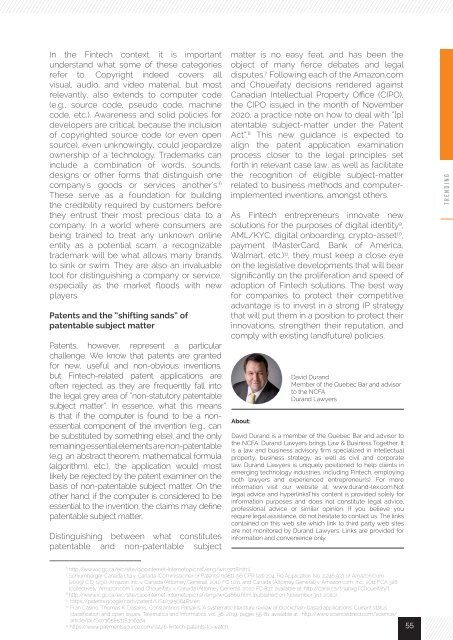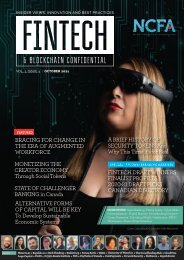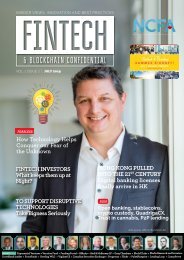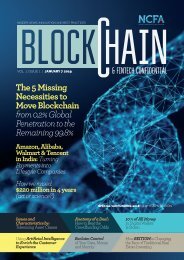NCFA Fintech Confidential December 2020 (Issue 3)
The National Crowdfunding & Fintech Association of Canada (NCFA) and partners are excited to present Vol. 1 Issue 3, FINTECH CONFIDENTIAL, a digital pop-up of the 6th annual 2020 Fintech & Financing Conference and Expo (FFCON20) held virtually across themed 8 weeks from July 9 to August 27 and co-hosted by NCFA and Toronto Finance International. The main theme of FFCON20 was “RISE”, reflecting the joint efforts of the two associations, NCFA and TFI, to build and increase the success and sustainability of Canada’s fintech and financial sector. There were many moving parts this year and a brand-new digital format with the event bringing together 100+ thought leaders, 50+ partners, and more than 500 attendees, 2 challenges and the inaugural Fintech Draft pitching and demo competitions. Congratulations to the winners: SolidBlock and MazumaGo (formerly DivDot)! Thanks to all the partners, speakers, attendees, volunteers and the entire organizing team for making FFCON20 an impactful and amazing online experience for Canada’s fintech and funding community. We hope you enjoy this issue of Fintech Confidential magazine – it certainly makes for great holiday reading! While everyone relentlessly strives to achieve success in 2021, we encourage you to bring in the new year with good health and to be mindful that we are all in this together, and to help others in your community more than ever before. Peace, happiness, and best wishes for an incredible year and journey ahead.
The National Crowdfunding & Fintech Association of Canada (NCFA) and partners are excited
to present Vol. 1 Issue 3, FINTECH CONFIDENTIAL, a digital pop-up of the 6th annual 2020 Fintech & Financing Conference and Expo (FFCON20) held virtually across themed 8 weeks from July 9 to August 27 and co-hosted by NCFA and Toronto Finance International.
The main theme of FFCON20 was “RISE”, reflecting the joint efforts of the two associations, NCFA and TFI, to build and increase the success and sustainability of Canada’s fintech and financial sector. There were many moving parts this year and a brand-new digital format with the event bringing together 100+ thought leaders, 50+ partners, and more than 500 attendees, 2 challenges and the inaugural Fintech Draft pitching and demo competitions. Congratulations to the winners: SolidBlock and MazumaGo (formerly DivDot)! Thanks to all the partners, speakers, attendees, volunteers and the entire organizing team for making FFCON20 an impactful and amazing online experience for Canada’s fintech and funding community.
We hope you enjoy this issue of Fintech Confidential magazine – it certainly makes for great holiday reading! While everyone relentlessly strives to achieve success in 2021, we encourage you to bring in the new year with good health and to be mindful that we are all in this together, and to help others in your community more than ever before. Peace, happiness, and best wishes for an incredible year and journey ahead.
You also want an ePaper? Increase the reach of your titles
YUMPU automatically turns print PDFs into web optimized ePapers that Google loves.
In the <strong>Fintech</strong> context, it is important<br />
understand what some of these categories<br />
refer to. Copyright indeed covers all<br />
visual, audio, and video material, but most<br />
relevantly, also extends to computer code<br />
(e.g., source code, pseudo code, machine<br />
code, etc.). Awareness and solid policies for<br />
developers are critical, because the inclusion<br />
of copyrighted source code (or even open<br />
source), even unknowingly, could jeopardize<br />
ownership of a technology. Trademarks can<br />
include a combination of words, sounds,<br />
designs or other forms that distinguish one<br />
company’s goods or services another’s. 6<br />
These serve as a foundation for building<br />
the credibility required by customers before<br />
they entrust their most precious data to a<br />
company. In a world where consumers are<br />
being trained to treat any unknown online<br />
entity as a potential scam, a recognizable<br />
trademark will be what allows many brands<br />
to sink or swim. They are also an invaluable<br />
tool for distinguishing a company or service,<br />
especially as the market floods with new<br />
players.<br />
Patents and the “shifting sands” of<br />
patentable subject matter<br />
Patents, however, represent a particular<br />
challenge. We know that patents are granted<br />
for new, useful and non-obvious inventions,<br />
but <strong>Fintech</strong>-related patent applications are<br />
often rejected, as they are frequently fall into<br />
the legal grey area of “non-statutory patentable<br />
subject matter”. In essence, what this means<br />
is that if the computer is found to be a nonessential<br />
component of the invention (e.g., can<br />
be substituted by something else), and the only<br />
remaining essential elements are non-patentable<br />
(e.g. an abstract theorem, mathematical formula<br />
(algorithm), etc.), the application would most<br />
likely be rejected by the patent examiner on the<br />
basis of non-patentable subject matter. On the<br />
other hand, if the computer is considered to be<br />
essential to the invention, the claims may define<br />
patentable subject matter.<br />
Distinguishing between what constitutes<br />
patentable and non-patentable subject<br />
matter is no easy feat, and has been the<br />
object of many fierce debates and legal<br />
disputes. 7 Following each of the Amazon.com<br />
and Choueifaty decisions rendered against<br />
Canadian Intellectual Property Office (CIPO),<br />
the CIPO issued in the month of November<br />
<strong>2020</strong>, a practice note on how to deal with “[p]<br />
atentable subject-matter under the Patent<br />
Act”. 8 This new guidance is expected to<br />
align the patent application examination<br />
process closer to the legal principles set<br />
forth in relevant case law, as well as facilitate<br />
the recognition of eligible subject-matter<br />
related to business methods and computerimplemented<br />
inventions, amongst others.<br />
As <strong>Fintech</strong> entrepreneurs innovate new<br />
solutions for the purposes of digital identity 9 ,<br />
AML/KYC, digital onboarding, crypto-asset 10 ,<br />
payment (MasterCard, Bank of America,<br />
Walmart, etc.) 11 , they must keep a close eye<br />
on the legislative developments that will bear<br />
significantly on the proliferation and speed of<br />
adoption of <strong>Fintech</strong> solutions. The best way<br />
for companies to protect their competitive<br />
advantage is to invest in a strong IP strategy<br />
that will put them in a position to protect their<br />
innovations, strengthen their reputation, and<br />
comply with existing (andfuture) policies.<br />
About:<br />
David Durand<br />
Member of the Quebec Bar and advisor<br />
to the <strong>NCFA</strong><br />
Durand Lawyers<br />
David Durand is a member of the Quebec Bar and advisor to<br />
the <strong>NCFA</strong>. Durand Lawyers brings Law & Business Together. It<br />
is a law and business advisory firm specialized in intellectual<br />
property, business strategy, as well as civil and corporate<br />
law. Durand Lawyers is uniquely positioned to help clients in<br />
emerging technology industries, including <strong>Fintech</strong>, employing<br />
both lawyers and experienced entrepreneur(s). For more<br />
information visit our website at: www.durand-lex.com.Not<br />
legal advice and hyperlinksThis content is provided solely for<br />
information purposes and does not constitute legal advice,<br />
professional advice or similar opinion. If you believe you<br />
require legal assistance, do not hesitate to contact us. The links<br />
contained on this web site which link to third party web sites<br />
are not monitored by Durand Lawyers. Links are provided for<br />
information and convenience only.<br />
TRENDING<br />
6<br />
http://www.ic.gc.ca/eic/site/cipointernet-Internetopic.nsf/eng/wr03718.html.<br />
7<br />
Schlumberger Canada Ltd v. Canada (Commissioner of Patents) (1981), 56 CPR (2d) 204; Re Application No. 2,246,933 of Amazon.Com<br />
(2009) C.D. 1290, Amazon Inc. v. Canada (Attorney General), 2010 FC 1011, and Canada (Attorney General) v. Amazon.com, Inc., 2011 FCA 328<br />
[collectively “Amazon.com”]; and Choueifaty v. Canada (Attorney General), <strong>2020</strong> FC 837, available at: http://canlii.ca/t/j9bxg [“Choueifaty”].<br />
8<br />
http://www.ic.gc.ca/eic/site/cipointernet-internetopic.nsf/eng/wr04860.html (published on November 3rd, <strong>2020</strong>).<br />
9<br />
https://patents.google.com/patent/US10325084B1/en.<br />
10<br />
Fran Casino, Thomas K. Dasaklis, Constantinos Patsakis, A systematic literature review of blockchain-based applications: Current status,<br />
classification and open issues, Telematics and Informatics, vol. 36, 2019, pages 55-81, available at : http://www.sciencedirect.com/science/<br />
article/pii/S0736585318306324.<br />
11<br />
https://www.paymentssource.com/list/6-fintech-patents-to-watch.<br />
55






